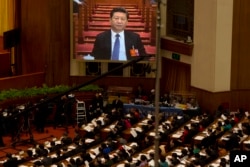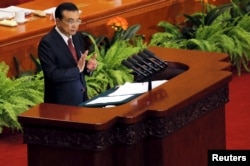China’s annual meetings in Beijing are a key opportunity in the political calendar for officials to take stock of the past year’s successes and failures and fine tune their messaging about key topics such as the economy, environment and social issues.
It is also a time when undercurrents and key concerns surface despite the tightly scripted meetings and daily flood of press conferences at the “2 Sessions”- meetings for China’s top legislative body the National People’s Congress (NPC) and Chinese People’s Political Consultative Conference (CPPCC).
This year is no exception, and the direction China’s increasingly powerful leader Xi Jinping is taking the world’s second largest economy is a key point of discussion and, for some, a growing concern.
“There’s a groundswell of discontent among NPC members, intellectuals, experts in Beijing, even more liberal party officials, that Xi is turning back the clock… imposing a kind of a dictatorial model on the party,” said Willy Lam, an expert on elite Chinese politics. “However, at this stage, I think except for relatively few liberal academics, most government officials and NPC members will not dare not openly criticize Xi Jinping.”
Free speech debate grows
Last year, it was a documentary about China’s notorious smog that had social media buzzing. The documentary “Under the Dome,” which was produced by a former state media reporter went viral, attracting hundreds of millions of views before it was eventually blocked online shortly after the meetings started.
This year, just days before the meetings opened last week, a politically connected and the social media account of prominent former property businessman Ren Zhiqiang was shut down after he criticized President Xi.
Ren’s account, which had more than 37 million followers, was taken offline after he took issue with comments Xi made during a visit to party media headquarters stressing that they should tow the party line in their reporting.
Although that silenced Ren and has put his fate in question, others continue to voice concerns.
An interview with Caixin magazine, Jiang Hong, a veteran finance professor and delegate to the CPPCC who is known for speaking up at the annual meetings, said “certain events” were casting a shadow over this year’s meetings.
In his interview with Caixin, Jiang did not say what he meant by certain events, but added that because of those events everyone attending the meetings felt a bit “dazed” and “did not want to talk so much.”
Caixin’s interview with Jiang was later taken down but discussions about Ren and Jiang’s remarks continue on social media, including accusations that his comments violated party regulations.
On social media, authorities worked quickly to limit re-posting of articles on the topic and comments were blocked shortly after they were put up.
On Tuesday, Caixin filed a report on its English website, featuring the mouth of a Chinese citizen and a red stop sign painted over it. The article was entitled “Story about Advisors Free Speech Comments Removed from Caixin Website.”
That too was taken down shortly afterwards.
No light at the end of the tunnel
David Bandurski, editor of the University of Hong Kong’s China Media Project, said all of the uncertainty about the social, political and economic environment was creating a perception of instability, which may also correspond to real instability.
“And this is the kind of situation even regardless of who Xi Jinping is in terms of his thinking and his policies, the media is going to be controlled very very tightly,” said Bandurski. But he added that what is happening now unprecedented for the reform era and that it was hard to see a light at the end of the tunnel.
The debate, however, is not only about media control, but a broader tightening that is going on as well simultaneously including controls over film to online publishing. There is even question whether party members are internally being able to discuss policies.
“If you can’t look at the fact, if you can’t make small decisions about the future, and you can’t even talk about the future in an intelligent way, this is bad news for China,” said Bandurski.
For now, the backlash appears to not have stopped not stopped Jiang Hong, who has said that he is considering putting forward a proposal on free speech during the meetings, even as he continues to voice concern about a topic he usually comments on - economic reform.
Xi as the 'Core'
Since coming to power three years ago, Xi Jinping’s leadership has been marked by a distaste for dissent, from the more recent disappearances of booksellers overseas and in Hong Kong to televised confessions and ever-tightening controls on the Internet and media.
Analysts say the tightening control is aimed at stabilizing Xi’s position as head of the government, party and military, and silencing any criticism at a time when China’s economy is slowing dramatically.
At the same time, there has also been a push in state media to enshrine Xi as the “core” leader of the party a status similar to that once held by Deng Xiaoping.
In the government’s work report, which was delivered on Saturday by Premier Li Keqiang, he called on members of the NPC to “rally close around the CPC Central Committee headed by General Secretary Xi Jinping” to fulfill this year’s economic and social development targets and tasks.
While the push seeks to elevate Xi, it also puts the brunt of responsibility for fixing the economy squarely on his shoulders.
David Zweig, a political scientist at the Hong Kong University of Science and Technology, said one of the difficult questions for outside observers was judging whether Xi was in it for power or whether he was tightening down to push through reforms.
“If we do see the continuation of the drive for reforms and it does have some success, then we can’t reject the idea that he’s doing this in part to consolidate enough power to run sort of run over the opponents,” said Zweig. “I think once the reforms are dead in the water… then we’ll in a much stronger position to say he’s doing power for the sake of power.”
21st Century Mao
In addition to how economic reforms are progressing, another key signal will be who Xi selects to head the country’s top level politburo standing committee in the fall of 2017 and who becomes vice president, a key grooming position for the future leaders.
Analysts note that if someone such as Hu Chunhua, the communist party boss in China’s southern Guangdong province is selected as a senior candidate to take over as vice president, then it will be clearer that a hand over is on the horizon.
“But if there’s nobody in those authorities in that vice presidency, then, there’s the possibility that he’s just not grooming anybody,” said Zweig.
For now, in absence of any clear rising stars to replace him and persistent talk that that Xi may not need to step down after 10 years in office as expected in 2023, analysts say Xi may be aiming to stay in office longer than his predecessors.
“Most of the pieces of information that we get from Beijing points to the fact that Xi Jinping wants to be Mao Zedong of the 21st century. And that he’s seeking three terms of office. That is, he may stay in power until 2027” and that at this stage “he’s in no hurry to identify his successors,”said Willy Lam.
“This is, of course, very bad for political reform. This is a return to the Maoist system of a semi-imperial leader imposing his wishes on the country,” he added.






